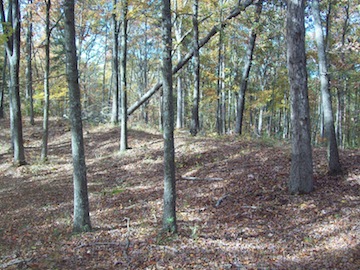The Final Fight at Resaca

The second day of the Battle of Resaca proved to be no less horrific than the first. Hood’s Corps, having gained some ground, had during the night moved to defend it. The following fight would become the most famous episode of the Battle, the fight for Max Van Den Corput’s Georgia Battery, known as the Cherokee Artillery, from Rome, Georgia.
A few days later, Major Hampton Cheney of the staff of Gen. John C. Brown wrote to the Memphis Appeal, a refugee newspaper being printed in Atlanta, about the brutal fight for the four bronze guns and what followed:

Sunday morning, at an early hour, we were again ordered forward to take position on the eminence on our front, which we supposed was occupied by the enemy, but our skirmishers moved forward without interruption, and we were soon heavily engaged in throwing up hasty breastworks of logs, chincky, and whatever came to hand. By 10 o’clock in the morning they were completed and everything in readiness to meet whatever aggressive movement the enemy contemplates, a position being selected fifty yards in advance of the left wing of our command for Corpet’s battery of twelve pound Napoleons, numbering four guns; by the engineers redoubts were being hastily thrown up, when about twelve o’clock the enemy’s skirmishers opened a heavy fire upon our pickets, driving them on their line of battle, following so closely that the 32n Tennessee, working upon the redoubt, found themselves suddenly opposed to a line of Yankees within a few rods of them, and were compelled to fight their way back to the intrenchments, hand to hand with picks, spades, and rocks, the enemy planting their colors upon the battery, but unable to remove it, the 32nd and 26th Tennessee regiments, commanded by the gallant Colonels Cook and Saffell resisting every effort made. The country in our front was thickly wooded and covered with dense undergrowth, concealing their advance until very near, under this cover they had massed their troops in immense numbers and advanced cautiously in their lines of battle until sufficiently near, when they burst upon us with a loud hurrah. The first line approached to within twenty steps of our breastworks, but withered away before the galling fire poured upon them, the second line, nothing daunted, still pressed on, but were hurled back upon the third, which gave way and precipitately fled. An hour wore on, unbroken save by the incessant fire of their sharpshooters, when a fresh column appeared again, formed in three lines. It now became manifest that their whole efforts were directed by this point, and that they were determined to carry it at any sacrifice. On they came, confident in superior numbers, while a perfect storm of bullets heralded their approach, but again they were handsomely repulsed; a third and a fourth desperate assault was made, but each time met like success. The brave Tennesseans stood cool, clam, and unflenching, met and repulsed each assault, and fully sustained the reputation achieved for themselves on so many bloody fields.

By the way, our is the only Tennessee brigade in this corps, (Hood’s) and knowing that any flinching on our part would reflect upon the body of the Tennessee troops and the noble old State from which we hail, we are doubly particular, determined to sustain the proud name which is ours, and prove ourselves worthy the inheritance for which we are battling. Our ammunition being exhausted, after expending forty rounds per man, we yielded the rifles pits to Reynold’s brigade in order to replenish our empty cartridge boxes and cleanse our guns. It would be folly in me to attempt to describe the conduct of particular officers or men for where all acted nobly, courageously, praise would be invidious. Our gallant commander did but act with his usual conspicuous gallantry and heroism, freely exposing his person where danger was thickest, and by his presence and cool, calm demeanor inspired the men with courage and confidence. He was frequently urged to leave the rifle pits and only consented when told that he was “in the way.” He had not only the entire confidence, but complete devotion of the whole command. One other gallant spirit deserves particular notice for the self sacrificing spirit, true devotion to his country and implicit obedience to orders displayed on the night of this same day. Orders having been issued for the withdrawal of the troops from the lines of works, preliminary to crossing the river, Lieut Col. Clack’s 3d Tennessee regiment was left with a thin line of skirmishers to hold the abandoned rifle pits and cover the withdrawal of his command. Knowing the enemy to have overwhelming numbers massed in his front his right and left flanks exposed, and nothing to support him, he naturally presumed that it was deemed expedient to sacrifice himself and command. He immediately held a consultation with his officers and inquired if they were willing and ready for the sacrifice. Their unanimous and noble response was-we are. Arrangements were then made for a desperate resistance, the colonel cautioning his men not to recognize any command he gave them, but on the approach of the enemy to fire as rapidly as possible. Soon the anticipated night assault came met by a sheet of fire from the breastworks, while amid the din of musketry could be hear the clear ringing voice of their commander, “Hold your fire men, do not waste your ammunition, let them come closer.” This piece of deception, their repeated repulses through the day, made the effort a weak one, and they were easily driven back. Again silence reigns. Naught disturbs this deep stillness save the mournful chant of the whipperwill. The moon shines down in unclouded luster, disclosing the little band of Spartan heroes, standing firm with faces resolved and determined, which thoughts of home, a prairie in the distance, or a grove upon the lonely hillside, could not daunt, but their hour of deliverance was at hand. A craven hearted courier, dispatched to bring them in alarmed at the firing, never reaching his destination; the second brought the order to retire, and they are now safely with us.
Can you provide source for the Memphis Appeal article? I am compiling a story about the assault on Corput’s battery and would like to use it as a reference. Appreciate your post!